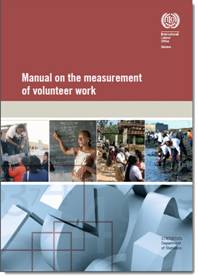The Professor Is In: Using Classroom Techniques In Your Volunteering Presentations, Part 2
 After more than a decade in the classroom, Sarah Jane Rehnborg has taught volunteer management on the graduate level to students from public affairs, business management, social work, communications, fine arts and other areas of specialization. Along the way, Rehnborg discovered some interesting resources and methods to convey some of the key concepts in volunteer management — teaching tools that are equally applicable to students and any audience that needs to be educated about our field.
After more than a decade in the classroom, Sarah Jane Rehnborg has taught volunteer management on the graduate level to students from public affairs, business management, social work, communications, fine arts and other areas of specialization. Along the way, Rehnborg discovered some interesting resources and methods to convey some of the key concepts in volunteer management — teaching tools that are equally applicable to students and any audience that needs to be educated about our field.
In Part 1 of this article presented in our last issue, Rehnborg explored a technique for developing role-play scenarios and the use of current events in the classroom. Now, in Part 2, Rehnborg discusses ways to explore critical thinking skills, the value of guest speakers and the complexity of internship experiences. Just as she did in Part 1, Rehnborg shares useful resources that will help inform your own knowledge of the field, while helping you develop presentations that capture critical volunteer management issues for paid colleagues and volunteers as they learn the ropes of working with the community.


 Sarah Jane Rehnborg has more than a decade in the classroom – teaching volunteer management on the graduate level to students from public affairs, business management, social work, communications, fine arts and other areas of specialization. Along the way, Rehnborg found some interesting resources and methods to convey some of the key concepts in volunteer management. Since her students are frequently new to studying volunteer issues, these teaching tools are equally applicable to any audience that needs to be educated about our field.
Sarah Jane Rehnborg has more than a decade in the classroom – teaching volunteer management on the graduate level to students from public affairs, business management, social work, communications, fine arts and other areas of specialization. Along the way, Rehnborg found some interesting resources and methods to convey some of the key concepts in volunteer management. Since her students are frequently new to studying volunteer issues, these teaching tools are equally applicable to any audience that needs to be educated about our field. We hear over and over again how volunteers are indispensable to many organizations. While we have previously covered articles on different methods used to estimate a value for volunteer contributions, a new study out of New Zealand looks at how volunteer value is communicated, both internally and externally. In this issue, reviewer Laurie Mook examines how a team of researchers conducted a qualitative study of local and national medium-sized health charities, and provides some thought-provoking insights into the barriers and drivers to communicating volunteer value for these organizations. An interesting aspect of the study, Mook explains, is that the researchers interviewed the executive director, fundraising manager and manager of volunteers from each organization, providing for a more holistic look at how volunteer value is communicated. Mook also provides her insights into the practical implications of the study, encouraging readers to reflect on the implications of making volunteer contributions visible while also considering the impact of keeping them invisible.
We hear over and over again how volunteers are indispensable to many organizations. While we have previously covered articles on different methods used to estimate a value for volunteer contributions, a new study out of New Zealand looks at how volunteer value is communicated, both internally and externally. In this issue, reviewer Laurie Mook examines how a team of researchers conducted a qualitative study of local and national medium-sized health charities, and provides some thought-provoking insights into the barriers and drivers to communicating volunteer value for these organizations. An interesting aspect of the study, Mook explains, is that the researchers interviewed the executive director, fundraising manager and manager of volunteers from each organization, providing for a more holistic look at how volunteer value is communicated. Mook also provides her insights into the practical implications of the study, encouraging readers to reflect on the implications of making volunteer contributions visible while also considering the impact of keeping them invisible. Due to the nature of volunteering, this sector of society is not often associated with conflict. However, like the wider community, conflict within volunteer-involving organisations can be a persistent problem. Although most volunteers enjoy positive and fulfilling experiences and are generally satisfied with the volunteering process, research undertaken by Volunteering WA shows that around 10 per cent of volunteers have been involved in a conflict with an organisation where they have volunteered.
Due to the nature of volunteering, this sector of society is not often associated with conflict. However, like the wider community, conflict within volunteer-involving organisations can be a persistent problem. Although most volunteers enjoy positive and fulfilling experiences and are generally satisfied with the volunteering process, research undertaken by Volunteering WA shows that around 10 per cent of volunteers have been involved in a conflict with an organisation where they have volunteered. This issue’s Research to Practice provides great food for thought on organizational factors affecting volunteer management. For example, how do the goals of the organization, area of activity, or degree of bureaucracy impact the role that a volunteer management program can take in the strategic achievement of an organization’s mission? How can organizational settings be “assessed and aligned to the needs of volunteers, but also to those of the organization and society at large?”
This issue’s Research to Practice provides great food for thought on organizational factors affecting volunteer management. For example, how do the goals of the organization, area of activity, or degree of bureaucracy impact the role that a volunteer management program can take in the strategic achievement of an organization’s mission? How can organizational settings be “assessed and aligned to the needs of volunteers, but also to those of the organization and society at large?” In
In 
